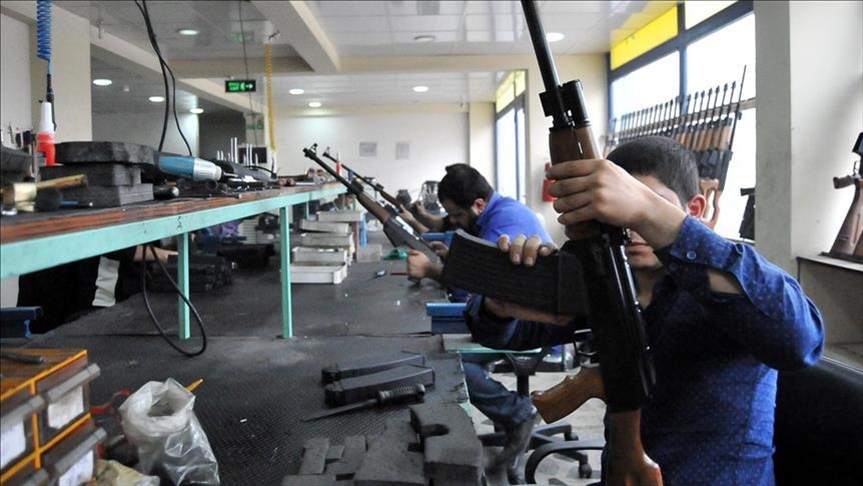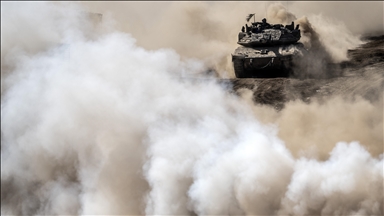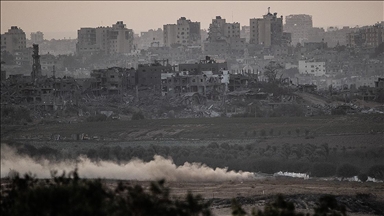Worldwide arms sales flat in 2010s
Int'l arms transfers remain close to highest levels since end of Cold War, says report by arms research center SIPRI

ISTANBUL
Major international arms transfers remained stable over the past decade, according to new data released on Monday by a Sweden-based defense and arms research center.
"For the first time since 2001–2005, the volume of deliveries of major arms between countries did not increase between 2011–15 and 2016–20," said the Stockholm International Peace Research Institute (SIPRI) in a report.
"However, international arms transfers remain close to the highest level since the end of the cold war," added the report.
Noting that there had been "substantial increases" in transfers by the US, France and Germany -- three of the world's top five arms exporters -- it said these were "largely offset" by declining Russian and Chinese arms exports.
According to the report, arms imports into the Middle East grew by 25% during this period.
The increase was driven chiefly by Saudi Arabia which expanded its purchases by 61%, as well as Egypt with 136% and Qatar with 361%, added the report.
"It is too early to say whether the period of rapid growth in arms transfers of the past two decades is over," said Pieter Wezeman, a senior researcher for the SIPRI Arms and Military Expenditure Program, according to the statement.
Wezeman also noted the economic impact of the COVID-19 pandemic could see some countries "reassessing their arms imports in the coming years."
"However, at the same time, even at the height of the pandemic in 2020, several countries signed large contracts for major arms," he added.
Turkey: Domestic production up, imports down
According to the report, Turkey's arms imports fell by 59% in 2011-15 and 2016-20.
"A major factor was the USA halting deliveries of F-35 combat aircraft to the country in 2019, after Turkey imported Russian air defence systems," it explained.
"Turkey is also increasing domestic production of major arms, to reduce its reliance on imports."
In April 2017, when its protracted efforts to buy an air defense system from the US proved fruitless, Turkey signed a contract with Russia to acquire the S-400 system.
US officials have voiced opposition to its deployment, claiming it would be incompatible with NATO systems and would expose F-35 jets to possible Russian subterfuge.
Turkey, however, stressed that the S-400 would not be integrated into NATO systems and poses no threat to the alliance or its armaments.
Asia, Oceania arms imports on rise
The report highlighted that Asia and Oceania were the regions importing the most major arms, receiving 42% of global arms transfers in 2016-2020.
"India, Australia, China, South Korea and Pakistan were the biggest importers in the region," according to the report.
It added that the UK's arms exports had dropped by 27% between 2011-15 and 2016-20. "The UK accounted for 3.3 per cent of total arms exports in 2016–20."
On recent clashes between Armenia and Azerbaijan that flared up last year, the report said: "Both Armenia and Azerbaijan have been building up their military capabilities through major arms imports in recent years."
"In 2016–20 Russia accounted for 94 per cent of Armenian arms imports while Israel accounted for 69 per cent of Azerbaijan's arms imports."
Relations between the two former Soviet republics have been tense since 1991, when the Armenian military occupied Nagorno-Karabakh, also known as Upper Karabakh, a territory internationally recognized as part of Azerbaijan, and seven adjacent regions.
When new clashes erupted on Sept. 27 last year, Armenia launched attacks on civilians and Azerbaijani forces, and even violated several humanitarian cease-fire agreements.
During the six week-conflict, which ended with a Russian-brokered truce, Azerbaijan liberated several strategic cities and nearly 300 of its settlements and villages from Armenian occupation. The two countries signed a Russian-brokered agreement on Nov. 10 to end the fighting and work toward a comprehensive resolution.
Anadolu Agency website contains only a portion of the news stories offered to subscribers in the AA News Broadcasting System (HAS), and in summarized form. Please contact us for subscription options.



